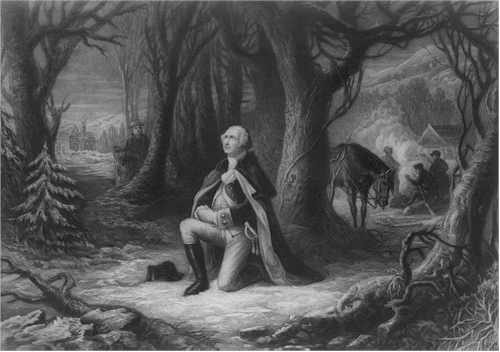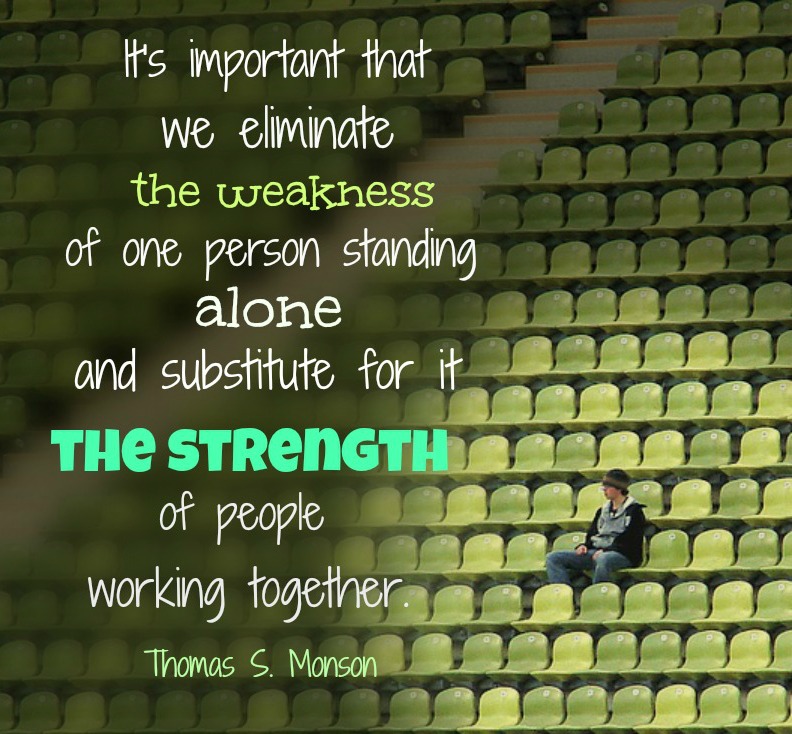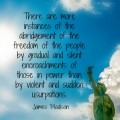There just aren’t as many Christians in America as there used to be, according to the 2014 Pew religious landscape study. Between 2007 and 2014, the Christian share of the population fell from 78.4% to 70.6%. The religious landscape of America is changing. It’s not that religion doesn’t play a part in our society, it’s just that as a whole, it does not seem to be as important as it used to be. One aspect of American life that is still holding strong, however, is our belief in God. The study states:
The share of U.S. adults who say they believe in God, while still remarkably high by comparison with other advanced industrial countries, has declined modestly, from approximately 92% to 89%, since Pew Research Center conducted its first Landscape Study in 2007. The share of Americans who say they are “absolutely certain” God exists has dropped more sharply, from 71% in 2007 to 63% in 2014.
Most of the declines in numbers are gradual, but they are heading down. The study states:
Is the American public becoming less religious? Yes, at least by some key measures of what it means to be a religious person. An extensive new survey of more than 35,000 U.S. adults finds that the percentages who say they believe in God, pray daily and regularly go to church or other religious services all have declined modestly in recent years.
But the Pew Research Center study also finds a great deal of stability in the U.S. religious landscape. The recent decrease in religious beliefs and behaviors is largely attributable to the “nones” – the growing minority of Americans, particularly in the Millennial generation, who say they do not belong to any organized faith. Among the roughly three-quarters of U.S. adults who do claim a religion, there has been no discernible drop in most measures of religious commitment. Indeed, by some conventional measures, religiously affiliated Americans are, on average, even more devout than they were a few years ago.
Another interesting finding is that most Americans still say they regularly have spiritual experiences. So while most Americans still consider themselves spiritual, those who consider themselves religious are declining in numbers. Is there a difference between spirituality and religiosity? And does it matter if you’re religious as long as you are spiritual? Mormons believe the answer to both questions is a resounding yes—not only to us as individuals but to our nation as a whole. The Pew study gives us a glimpse of the changing religious landscape in our nation. The doctrines of The Church of Jesus Christ of Latter-day Saints help us to see why it matters.
Religious Foundations of Our Nation
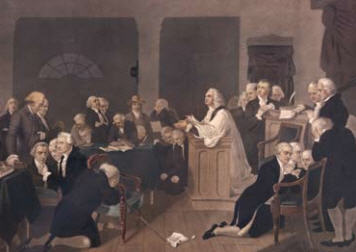
The Rev. Jacob Duché leading the first prayer for the Second Continental Congress, Philadelphia, September 7, 1774
Religion matters. It has been an important part of America from its beginning. James Madison, who is often referred to as the father of the U.S. Constitution, said,
We have staked the whole future of American civilization not upon the power of the government—far from it. We have staked the future of all of our political institutions upon the capacity of each and all of us to govern ourselves according to the Ten Commandments of God. (Russ Walton, Biblical Principles of Importance to Godly Christians, New Hampshire: Plymouth Foundation, 1984, p. 361.)
George Washington concurred. He said,
Reason and experience both forbid us to expect that national morality can prevail in exclusion of religious principle. (James D. Richardson, A Compilation of the Messages and Papers of the President, 1789–1897, U.S. Congress, 1899, vol. 1, p. 220.)
Religion played a vital role in the founding of the United States, and it is still an important component today. In fact, members of The Church of Jesus Christ believe that our nation must serve God or perish. President Ezra Taft Benson taught,
America, North and South, is a choice land, a land reserved for God’s own purposes. This land and its inhabitants are under an everlasting decree. The Lord revealed this decree to the brother of Jared, an American prophet, in these solemn words:
“And now, we can behold the decrees of God concerning this land, that it is a land of promise; and whatsoever nation shall possess it shall serve God, or they shall be swept off when the fulness of his wrath shall come upon them. And the fulness of his wrath cometh upon them when they are ripened in iniquity. …
“Behold, this is a choice land, and whatsoever nation shall possess it shall be free from bondage, and from captivity, and from all other nations under heaven, if they will but serve the God of the land, who is Jesus Christ. …” (Ether 2:9, 10, 12.)
But Mormon prophets aren’t the only ones who saw and understood the importance of American morality and religious observance. The famous French historian Alexis de Toqueville said,
I sought for the greatness and genius of America in her commodious harbors and her ample rivers, and it was not there; in her fertile fields and boundless prairies, and it was not there; in her rich mines and her vast world commerce, and it was not there. Not until I went to the churches of America and heard her pulpits aflame with righteousness did I understand the secret of her genius and power. America is great because she is good, and if America ever ceases to be good, America will cease to be great. (Prophets, Principles and National Survival, compiled by Jerreld L. Newquist [Salt Lake City, Publishers Press, 1964], p. 60.)
America’s greatness depends upon the righteousness and religious observance of her citizens. Thus the religious landscape of America is of concern to all—the declines as well as the strengths in the numbers. The real benefit of the Pew research is that it shows the direction in which America’s religious landscape is heading. And if we don’t like where it’s going, we know where we need to focus our efforts to make the necessary changes. So what exactly do the numbers show about God in America today?
Most Americans Believe in God and Practice Religion
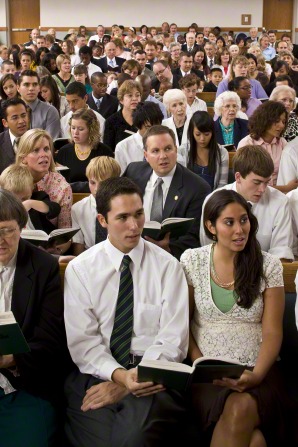 While the rise of those who do not believe in God is a concern, the majority of Americans—71%— still express a belief in God. Although those who are not religiously affiliated are also less religiously observant, the reverse is also true. According to the study:
While the rise of those who do not believe in God is a concern, the majority of Americans—71%— still express a belief in God. Although those who are not religiously affiliated are also less religiously observant, the reverse is also true. According to the study:
… The vast majority of Americans (77% of all adults) continue to identify with some religious faith. And this religiously affiliated population — comprising a wide variety of Protestants as well as Catholics, Jews, Mormons, Muslims, Buddhists, Hindus and adherents of other faith traditions — is, on the whole, just as religiously committed today as when the study was first conducted in 2007. Fully two-thirds of religiously affiliated adults say they pray every day and that religion is very important to them, and roughly six-in-ten say they attend religious services at least once or twice a month; those numbers have changed little, if at all, in recent years. And nearly all religiously affiliated people in the survey (97%) continue to believe in God, though a declining share express this belief with absolute certainty (74% in 2014, down from 79% in 2007).
This religious commitment and belief in God is evidenced in religious observance. The study notes:
Indeed, by some measures, religiously affiliated people appear to have grown more religiously observant in recent years. The portion of religiously affiliated adults who say they regularly read scripture, share their faith with others and participate in small prayer groups or scripture study groups all have increased modestly since 2007. And roughly four-in-ten religiously affiliated adults (41%) now say they rely mainly on their religious beliefs for guidance on questions about right and wrong, up 7 percentage points in seven years.
Religious observance is much more than just attending worship services on a regular basis. Religion plays a much greater role in our society than many unbelievers may see. Elder Wilford W. Andersen said,
It is perhaps less obvious to some that religion and morality play an essential role in maintaining and promoting good and effective government. The only real solutions to many of the serious problems facing our world today are spiritual, not political or economic. Racism, violence, and hate crimes, for example, are spiritual problems, and their only real solution is spiritual.
Elder Dallin H. Oaks agreed,
Many of the most significant moral advances in Western society have been motivated by religious principles and persuaded to official adoption by pulpit preaching. Examples include the abolition of the slave trade in England and the Emancipation Proclamation in this country. The same is true of the Civil Rights movement of the last half-century. These great advances were not motivated and moved by secular ethics or persons who believed in moral relativism. They were driven primarily by persons who had a clear religious vision of what was morally right.
Our society is not held together primarily by law and its enforcement, but most importantly by those who voluntarily obey the unenforceable because of their internalized norms of righteous or correct behavior. Religious belief in right and wrong is a vital influence to produce such voluntary compliance by a large number of our citizens.
This is what makes religious observance and religious beliefs so important in America today. It is not enough to profess a belief in God. This is just the beginning. What makes religion in society so essential is what religion does for the individual. Those who believe in God believe that their behavior and choices matter not only here on earth but also in the afterlife. Thus, obedience to the commandments of God takes on a deeper meaning. How we treat our neighbors also takes on a deeper meaning.
Religion Strengthens Society
Religion itself is good for society for many reasons. Interestingly, an overwhelming majority of Americans agree with this. The study states:
Nearly nine-in-ten adults say churches and other religious institutions bring people together and strengthen community bonds and that they play an important role in helping the poor and needy. And three-quarters say churches and other religious institutions help protect and strengthen morality in society. Attitudes on these questions are little changed from 2012, when they were first asked in a Pew Research Center survey.
It is significant that 75% of Americans believe that churches and other religious institutions help to protect and strengthen morality in society. Elder Russell M. Ballard said,
Madison, Washington, and Lincoln all understood that democracy cannot possibly flourish in a moral vacuum and that organized religion plays an important role in preserving and maintaining public morality. Indeed, John Adams, another of America’s Founding Fathers, insisted: “We have no government armed with power capable of contending with human passions unbridled by morality and religion.” (John Adams, The Works of John Adams, Second President of the United States, Charles F. Adams, 1854.)
Yet that is precisely the position we find ourselves in today. Our government is succumbing to pressure to distance itself from God and religion. Consequently, the government is discovering that it is incapable of contending with people who are increasingly “unbridled by morality and religion.” A simple constitutional prohibition of state-sponsored church has evolved into court-ordered bans against representations of the Ten Commandments on government buildings, Christmas manger scenes on public property, and prayer at public meetings. Instead of seeking the “national morality” based on “religious principle” that Washington spoke of, many are actively seeking a blind standard of legislative amorality, with a total exclusion of the mention of God in the public square.
Religion is good for society. Society’s beliefs and morality are ever-changing, but the commandments of God have remained the same since Adam and Eve. But as our nation moves away from respect for religion and toward a more secular philosophy, our moral foundation suffers. Where can we look for moral guidance if not religious teachings rooted in the gospel of Jesus Christ?
The Rise of the ‘Nones’
The problem with distancing ourselves from religious teachings is finding a replacement for them. The decline in the numbers who express a belief in God stems from a rise in the “nones,” or those who do not align themselves with any given denomination. The Pew study notes:
The falloff in traditional religious beliefs and practices coincides with changes in the religious composition of the U.S. public. A growing share of Americans are religiously unaffiliated, including some who self-identify as atheists or agnostics as well as many who describe their religion as “nothing in particular.” Altogether, the religiously unaffiliated (also called the “nones”) now account for 23% of the adult population, up from 16% in 2007.
Pew Research Center surveys consistently show that not all religious “nones” are nonbelievers. In fact, the majority of Americans without a religious affiliation say they believe in God. As a group, however, the “nones” are far less religiously observant than Americans who identify with a specific faith. And, as the “nones” have grown in size, they also have become even less observant than they were when the original Religious Landscape Study was conducted in 2007. The growth of the “nones” as a share of the population, coupled with their declining levels of religious observance, is tugging down the nation’s overall rates of religious belief and practice.
Those who don’t understand the importance of organized religion are often the ones seeking to distance themselves and others from it. President James E. Faust said,
There seems to be developing a new civil religion. The civil religion I refer to is a secular religion. It has no moral absolutes. It is non-denominational. It is nontheistic. It is politically focused. It is antagonistic to religion. It rejects the historic religious traditions of America. It feels strange. If this trend continues, nonbelief will be more honored than belief. While all beliefs must be protected, are atheism, agnosticism, cynicism, and moral relativism to be more safeguarded and valued than Christianity, Judaism, and the tenets of Islam, which hold that there is a Supreme Being and that mortals are accountable to him? If so, this would, in my opinion, place America in great moral jeopardy.
For those who believe in God, this new civil religion fosters some of the same concerns as the state religions that prompted our forefathers to escape to the New World. Nonbelief is becoming more sponsored in the body politic than belief. History teaches well the lesson that there must be a unity in some moral absolutes in all societies for them to endure and progress. Indeed, without a national morality they disintegrate.
This is perhaps one reason for the erosion of religious freedoms in America today. Elder Robert D. Hales said,
Some are offended when we bring our religion into the public square, yet the same people who insist that their viewpoints and actions be tolerated in society are often very slow to give that same tolerance to religious believers who also wish their viewpoints and actions to be tolerated. The general lack of respect for religious viewpoints is quickly devolving into social and political intolerance for religious people and institutions.
Not all of the nones are unbelievers. Some still profess a belief in God. But without the support of organized religion, there is always the danger of forgetting the importance of God in our lives.
Organized Religion Must Band Together
So now it’s time for organized religion to do what it does best—become organized. The solution to the changing religious landscape in America is for those who believe in God to root themselves more fully in the teachings of Jesus Christ and then take His gospel to the world. This means that all religious organizations need to work together for the common good. Cardinal Francis E. George, at the time the Catholic Archbishop of Chicago and also the President of the United States Conference of Catholic Bishops, speaking at Brigham Young University—the flagship university for The Church of Jesus Christ—in 2010, said,
… I come before you today as a religious leader who shares with you a love for our own country but also, like many, a growing concern about its moral health as a good society. In recent years Catholics and members of The Church of Jesus Christ of Latter-day Saints have stood more frequently side by side in the public square to defend human life and dignity. In addition to working together to alleviate poverty here and abroad, we have been together in combating the degradations associated with the pornography industry; in promoting respect for the right to life of those still waiting in their mother’s womb to be born; and in defending marriage as the union of one man and one woman for the sake of family against various efforts to redefine in civil law that foundational element of God’s natural plan for creation. I am personally grateful that, after 180 years of living mostly apart from one another, Catholics and Latter-day Saints have begun to see one another as trustworthy partners in the defense of shared moral principles and in the promotion of the common good of our beloved country.
Of course, partnerships in causes of great moral import build on friendships and gestures of respect for one another’s identity, and these too have multiplied in recent years.
It is so important for organized religion to stand together for a common cause. Elder Quentin L. Cook said,
This is a time when those who feel accountable to God for their conduct feel under siege by a secular world. You understand the moral principles that are under attack and the need to defend morality. Religious freedom all over the world is also under attack. It is important for us to become well educated on this issue and assume responsibility for ensuring that the religious freedom we have inherited is passed on to future generations. We must work together to both protect religious freedom and restore morality.
All religions have truth, and all benefit society. President Thomas S. Monson emphasized the need for religions to cooperate and work together. He said,
We have a responsibility to be active in the communities where we live … and to work cooperatively with other churches. … It’s important that we eliminate the weakness of one standing alone and substitute for it the strength of people working together.
One entity standing alone is not enough—especially when the importance of religion itself is at stake. It is through our cooperative efforts that all will see the essential nature of religion to our nation. Elder Cook said,
Our joint effort should be to protect important civic values like honesty, morality, self-restraint, respect for law, and basic human rights. An important study established, “The associations between religious freedoms and other civil liberties, press freedoms, and political freedoms are especially striking.” If we fail to diligently protect religious freedom, we risk diminishing other important freedoms that are important both to society and to us.
Our challenge is to help people without religious faith understand that the protection of moral principles grounded in religion is a great benefit to society and that religious devotion is critical to public virtue.
Our challenge today is to make sure that God is still great in America today—and that our children understand why it really matters.

